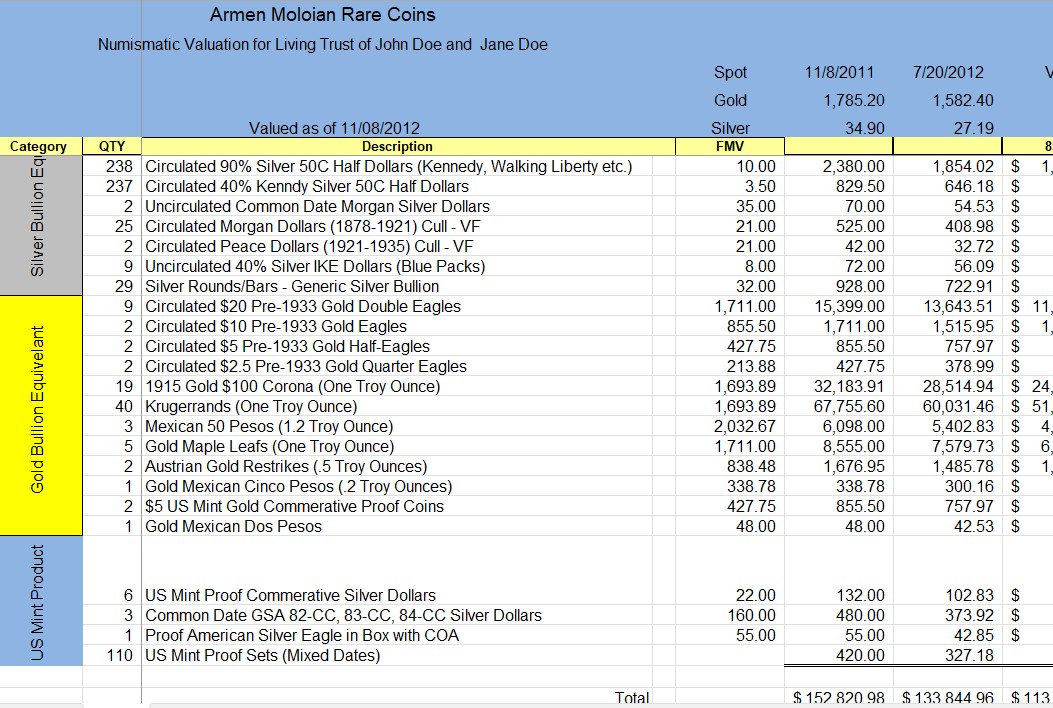
Are you wondering what your coins or Jewelry are worth?
Then this is the article for you. We put it at the top because this is one of the most common questions people have. At every major show, we get a very familiar story from different people quite regularly so that is always an “article” flag for us. Let me set the stage.
We are at a show and two women come up to our table and have an old cotton bank bag with some old coins in it and “wanted to get an idea of their value.” I of course asked them if they wanted a purchase offer price, or the price I was going to try and sell them for. They said, “A purchase price because we want to sell them.” I said that we could do that of course, but let me ask you one question first.
“How will you know if the offer I give you is fair? What are you going to base it on? How will you know?”
After the client recovers from that question for a moment with a gapping stare, this is where it gets interesting. The most popular answers seem to be ....
Answer A: I have a number in mind.
Answer B: I do not know, but I am looking for someone to be fair and honest.
Answer C: I have done my own research. This is always followed up with the question, “So are you a collector?”
Answer D: I am going to shop it around 3 dealers and get my best price.
Sorry if I go out of order, but Answer C is always a Reg Flag for me, so I want to address it first. I do not care how smart you are, or how good you are with a spreadsheet, I learned a long time ago that hope cares little about reality and you are the poster child for bias. These are the people who skip right to the rightmost column in the price guides because their coin clearly is an MS65 (even though they know nothing about grading). These are the people who if you do not agree with their valuations immediately conclude it can only be because you want to buy their valuable items for cents on the dollar. We get phone calls every week from people who “have a 1972 penny with no mint mark that they saw online is worth $10,000!”
Rather than try to educate the person, while they are accusing us of larceny. It has become much easier to tell them “The coin is not for us, and thank you” but even then, we still get some not-so-happy responses. This person is just in beginning process of knowing what they have and will inevitably err on the high side.
If the customer says they have a number in mind, I ask them “What is that number, and what's it based on?” you will ask. Here is where you have to listen carefully. Sometimes people are very reasonable and really do know what they have is worth, and if you can meet a person’s number that is always the best-case scenario. If after reviewing the items the customer and I are not far off, a negotiation can begin. But if we find ourselves with a disguised answer C, we tend to revert to minimizing our effort to make the purchase.
Answer B, while not being the easiest to articulate, is probably the most honest answer. Many people go by feel and if they feel comfortable that you are being fair and honest, you can easily come to a deal without the usual second-guessing or maybe even seller's remorse. While I have no issues with this approach, it still seems that should a customer run into a less-than-ethical dealer that tells a good story, they still have a possibility to be short-changed.
Answer D, this will make me lose interest quicker than most. It takes hours of work to go through an estate. Not only do you have to wade through what is common silver, but then spend the time on the 10% of the stuff that does have the potential for individual pricing, potential grading evaluation, and determining what I can sell it for, then backing that all down to make a profit, means that is a very complex and time-consuming process. It's one thing if it is a shoe box of coins, but quite another when it takes two people to carry it all. Anyway, these are people who are hoping to get a lot of people to do a lot of work for free. Well, it may not be if you get the deal right? Maybe, but it seems odd to do all that work to only get paid every third time you do it. If you are lucky and are not competing with someone's no-overhead tailgate office, you may get the deal. But good luck getting three dealers to commit to a written offer in a market that changes daily. And I always have to be weary when a deal does come back to me, it's because sometimes that means you have made a mistake and you are overpaying for something.
Ok, now that we got that person out of the shop let’s talk about real life. Here is a fact. You can argue it all you want, but to go through a collection is tremendous work for someone who knows what they are doing. It will take a long time, but it is possible. For a person who is new to coins, it’s not just a tremendous amount of work, but it is next to impossible. Unless you do not mind working for free, the notion that it takes 10,000 hours to get good at something is never more true than in the coins and jewelry business.
If you accept this premise, and some of you superhumans may not, you may want to consider the following. Depending on the volume and diversity of the collection in question, it may sometimes make sense to do one or more of the following.
- Sell your collection outright
- Consign part or all of the collection to a dealer or an auction house
- Get the collection professionally appraised.
How do you know which one is right for you? Well, that requires a professional appraisal. The following only makes sense for a large quantity collection. A shoebox full or more with heavy white silver coins. We are really excited for you about the 1972 No Mint Cent you found, but this scenario does not apply to single coins.
If you have access to a reputable dealer like us, preferably one who is state-licensed and insured, you may want to take advantage of a professional appraisal. What does this do for you? I am glad you asked.
Our appraisals come to you as a document. You receive a PDF File that provides you with the following information:
- Overview of the collection
- Describe what it is, condition, identify an upside potential
- Define what should be graded
- Define what should be auctioned (Should you have anything truly rare)
- Define what should be sold outright
- Inventory of Items
- Expected value
- Expected Retail: Sold directly via retail like eBay
- Expected Wholesale: Sold directly to a Dealer
- Gold and Silver Spot Prices at the time of the Appraisal. So, if Gold and Silver go up or down you can adjust the appraisal value accordingly thus staying in sync.
- Recommended Next Steps
Now not every box that comes through the door needs an appraisal, and that’s the first thing we will tell you if you were to show up with coffee cans full of wheat cents and were hoping we would fish a 1909-S VDB out of them for you, but I have been looking for one of those since I was 12 and still have not found it, so needless to say your results will vary depending on what you bring in.
Nothing arms you better than a bonified appraisal of what your collection is worth. It takes the guesswork out of the process and maximizes the value for the customer. Appraisals cost money and that money is to compensate the provider for the time they spend that ultimately provides you the confidence to know what you have and what it is truly worth, as well as what you can expect should you decide to sell it. The wholesale dealer offer is an open offer to actually buy the items in question. Not just a made-up price, but one backed up with real dollars. You can now take your report to any dealer, share it, and ask them to bid, and you will know which of those bids is fair and honest. But what usually happens, is after all that, most customers bring the collection back to us to sell to us, not just because it's tough to beat our offers, but because we refund the appraisal price should we be selected to buy the collection.
That’s how you know what it is worth....
